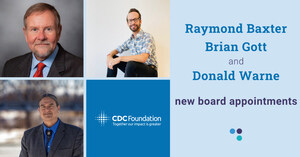ATLANTA, April 8, 2021 /PRNewswire/ -- Spero M. Manson, PhD, a leading authority with respect to American Indian and Alaska Native health, today was awarded the 2021 Elizabeth Fries Health Education Award. Manson is a distinguished professor and the Colorado Trust Chair in American Indian Health at the Colorado School of Public Health, at the University of Colorado Anschutz Medical Campus where he directs the Centers for American Indian and Alaska Native Health.
This year's award was presented virtually to Manson at the annual meeting of the Society for Public Health Education (SOPHE). Due to the coronavirus (COVID-19) emergency, SOPHE held their annual conference virtually. The CDC Foundation with the James F. and Sarah T. Fries Foundation honored Manson for his outstanding contributions to American Indian/Alaska Native (AI/AN) health by increasing resources, improving research and training, and elevating the quality of health services to tribal communities.
The Elizabeth Fries Health Education Award, first presented in 1992, recognizes a health educator who has made a substantial contribution to advancing the field of health education or health promotion through research, program development or program delivery.
"It's critical that all people have the opportunity to live their healthiest lives. Dr. Manson's commitment and passion to improving the health and well-being of American Indian and Alaska Native people is evident in all he does," said Martha Katz, MPA, chair, James F. and Sarah T. Fries Foundation Board of Directors. "We are grateful for his contributions and honored to present him with the Elizabeth Fries Health Education Award."
Manson is best known for improving the health and well-being of AI/AN people. He and his colleagues established the Centers for American Indian and Alaska Native Health (CAIANH), which is widely recognized as the premier venue for addressing population health matters faced by Native communities. Over his career, Manson has addressed the challenge of bringing culturally appropriate health education, grounded in evidence from community-participatory methods, to address the challenges faced by AI/AN communities. He has developed methods for research with tribal communities, established model approaches for mentoring Native researchers, and advanced and evaluated innovative solutions to problems such as substance and alcohol use, suicide and behavioral and mental health, that have affected generations of AI/AN people.
Manson has pioneered approaches to behavioral and chronic disease prevention and management. He draws upon theory and practice of tribal peoples and pairs indigenous knowledge with state-of-the-art public health theory. Through CAIANH, multiple Al/AN health interventions have been developed, piloted and disseminated for use in tribal communities and tribal health organizations, including the Special Diabetes Program for Indians. As the coordinating center for the Special Diabetes Program for Indians, his center recruited over 20,000 tribal members from the communities participating in the program and demonstrated widespread success in assisting tribal communities to achieve their community responsive intervention goals. In addition, Manson has pioneered research into mental health of Native peoples. He developed some of the first published studies on depression in this population and worked to develop instruments to reliably and validly identify related emotional problems in American Indian communities.
Manson's key appointments include serving on the National Advisory Councils for the Director of the National Institutes of Health (NIH) and the Director of the National Institute on Minority Health and Health Disparities. He has received several prestigious recognitions including being among the few Americans Indian members of the National Academy of Medicine, receiving the Bronislaw Malinowski Award from the Society for Applied Anthropology and a Lifetime Achievement Award from the Society for the Study of Psychiatry and Culture. In 2019 he was honored with both the Carl Taube Award for Lifetime Contribution to the Field of Mental Health from the American Public Health Association (APHA) and the National Institute of Health's (NIH) History Maker in Minority Health and Health Disparities Research.
Manson has written on mentoring and career development with emphasis on AI/AN investigators. His 250 peer-reviewed publications, four edited volumes, 38 book chapters have been cited in many academic publications. He has served as associate editor for several journals including the Journal on Aging and Ethnicity and Medical Anthropology Quarterly and serves as editor-in-chief for American Indian and Alaska Native Mental Health Research.
The Elizabeth Fries Health Education Award was named in memory of Elizabeth Fries, who was a professor of psychology at Virginia Commonwealth University and co-director of the Massey Cancer Center Outreach Program. She made many important contributions to program development, implementation and evaluation. The Elizabeth Fries Health Education Award recipients receive a $25,000 prize. The award and lecture have been presented annually at the SOPHE conference, which draws approximately 900 health education researchers, faculty, practitioners and students for the latest research and practice in health education. Founded in 1950, SOPHE's mission is to provide global leadership in health promotion and to promote the health of society.
The James F. and Sarah T. Fries Foundation is a nonprofit corporation incorporated in 1991. The mission of the Foundation is to identify and honor individuals, organizations or institutions that have made great contributions to the health of the public. The Foundation seeks to reward accomplishment rather than promise, practicality rather than theory.
The CDC Foundation is honored to partner with the James F. and Sarah T. Fries Foundation, which established and funds the award. As of 2016, the CDC Foundation manages and administers the Fries Foundation's public health award programs, which include the Fries Prize for Improving Health and the Elizabeth Fries Health Education Award.
About the CDC Foundation
The CDC Foundation helps the Centers for Disease Control and Prevention (CDC) save and improve lives by unleashing the power of collaboration between CDC, philanthropies, corporations, organizations and individuals to protect the health, safety and security of America and the world. The CDC Foundation is the go-to nonprofit authorized by Congress to mobilize philanthropic partners and private-sector resources to support CDC's critical health protection mission. Since 1995, the CDC Foundation has raised over $1.25 billion and launched more than 1,000 programs impacting a variety of health threats from chronic disease conditions including cardiovascular disease and cancer, to infectious diseases like rotavirus and HIV, to emergency responses, including COVID-19 and Ebola. The CDC Foundation managed hundreds of CDC-led programs in the United States and in more than 140 countries last year. Learn more at www.cdcfoundation.org and follow the Foundation on Twitter, Facebook, LinkedIn, Instagram and TikTok.
SOURCE CDC Foundation

Related Links
WANT YOUR COMPANY'S NEWS FEATURED ON PRNEWSWIRE.COM?
Newsrooms &
Influencers
Digital Media
Outlets
Journalists
Opted In






Share this article